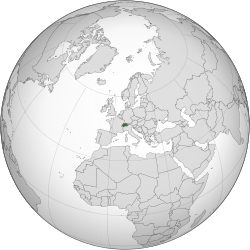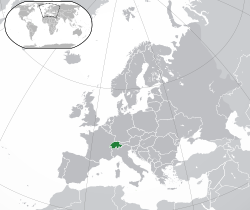
Back Швеицариа Abkhazian Swiss ACE Швейцарие ADY Switserland Afrikaans Schweiz ALS ስዊዘርላንድ Amharic Switzerland AMI Suiza AN Swissland ANG Siwizalan ANN
Swiss Confederation | |
|---|---|
| Motto: (unofficial) "Unus pro omnibus, omnes pro uno" "One for all, all for one" | |
| Anthem: "Swiss Psalm" | |
Location of Switzerland (green) in Europe (green and dark grey) | |
| Capital | 46°57′N 7°27′E / 46.950°N 7.450°E |
| Largest city | Zurich |
| Official languages | |
| Religion (2022)[3] |
|
| Demonym(s) | |
| Government | Federal assembly-independent[4][5] directorial republic |
| Viktor Rossi | |
| Legislature | Federal Assembly |
| Council of States | |
| National Council | |
| History | |
• Founded | 1 August 1291[b] |
• Sovereignty recognised (Peace of Westphalia) | 24 October 1648 |
| 7 August 1815 | |
| 12 September 1848[c][6] | |
| Area | |
• Total | 41,285 km2 (15,940 sq mi) (132nd) |
• Water (%) | 4.34[7] |
| Population | |
• 2023 estimate | |
• 2015 census | |
• Density | 207/km2 (536.1/sq mi) (48th) |
| GDP (PPP) | 2024 estimate |
• Total | |
• Per capita | |
| GDP (nominal) | 2024 estimate |
• Total | |
• Per capita | |
| Gini (2023) | medium inequality |
| HDI (2022) | very high (1st) |
| Currency | Swiss franc (CHF) |
| Time zone | UTC+1 (CET) |
• Summer (DST) | UTC+2 (CEST) |
| Date format | dd.mm.yyyy (Anno Domini) |
| Drives on | right |
| Calling code | +41 |
| ISO 3166 code | CH |
| Internet TLD | .ch, .swiss |
Switzerland, officially the Swiss Confederation, is a landlocked country located in west-central Europe.[d][13] It is bordered by Italy to the south, France to the west, Germany to the north, and Austria and Liechtenstein to the east. Switzerland is geographically divided among the Swiss Plateau, the Alps and the Jura; the Alps occupy the greater part of the territory, whereas most of the country's population of 9 million are concentrated on the plateau, which hosts its largest cities and economic centres, including Zurich, Geneva, and Basel.[14]
Switzerland originates from the Old Swiss Confederacy established in the Late Middle Ages, following a series of military successes against Austria and Burgundy; the Federal Charter of 1291 is considered the country's founding document. Swiss independence from the Holy Roman Empire was formally recognised in the Peace of Westphalia in 1648. Switzerland has maintained a policy of armed neutrality since the 16th century and has not fought an international war since 1815. It joined the United Nations only in 2002 but pursues an active foreign policy that includes frequent involvement in peace building.[15]
Switzerland is the birthplace of the Red Cross and hosts the headquarters or offices of most major international institutions including the WTO, the WHO, the ILO, FIFA, the WEF, and the UN. It is a founding member of the European Free Trade Association (EFTA), but not part of the European Union (EU), the European Economic Area, or the eurozone; however, it participates in the European single market and the Schengen Area. Switzerland is a federal republic composed of 26 cantons, with federal authorities based in Bern.[a][2][1]
Switzerland is one of the world's most developed countries and ranks 1st on the Human Development Index. It has the highest nominal wealth per adult[16] and the eighth-highest gross domestic product (GDP) per capita.[17][18] Switzerland performs highly on several international metrics, including economic competitiveness and democratic governance. Cities such as Zurich, Geneva and Basel rank among the highest in terms of quality of life,[19][20] albeit with some of the highest costs of living.[21] Switzerland holds an international reputation for its established banking sector, alongside its distinctive recognition for their watchmaking and chocolate production.
It has four main linguistic and cultural regions: German, French, Italian and Romansh. Although most Swiss are German-speaking, national identity is fairly cohesive, being rooted in a common historical background, shared values such as federalism and direct democracy,[22] and Alpine symbolism.[23][24] Swiss identity transcends language, ethnicity, and religion, leading to Switzerland being described as a Willensnation ("nation of volition") rather than a nation state.[25]
Cite error: There are <ref group=lower-alpha> tags or {{efn}} templates on this page, but the references will not show without a {{reflist|group=lower-alpha}} template or {{notelist}} template (see the help page).
- ^ a b Georg Kreis: Federal city in German, French and Italian in the online Historical Dictionary of Switzerland, 20 March 2015.
- ^ a b Holenstein, André (2012). "Die Hauptstadt existiert nicht". UniPress – Forschung und Wissenschaft an der Universität Bern (scientific article) (in German). 152 (Sonderfall Hauptstatdtregion). Bern: Department Communication, University of Bern: 16–19. doi:10.7892/boris.41280. S2CID 178237847.
Als 1848 ein politisch-administratives Zentrum für den neuen Bundesstaat zu bestimmen war, verzichteten die Verfassungsväter darauf, eine Hauptstadt der Schweiz zu bezeichnen und formulierten stattdessen in Artikel 108: "Alles, was sich auf den Sitz der Bundesbehörden bezieht, ist Gegenstand der Bundesgesetzgebung." Die Bundesstadt ist also nicht mehr und nicht weniger als der Sitz der Bundesbehörden.
[In 1848, when a political and administrative centre was being determined for the new federation, the founders of the constitution abstained from designating a capital city for Switzerland and instead formulated in Article 108: "Everything, which relates to seat of the authorities, is the subject of the federal legislation." The federal city is therefore no more and no less than the seat of the federal authorities.] - ^ "Religions". Neuchâtel, Switzerland: Federal Statistical Office. Archived from the original on 12 September 2024. Retrieved 30 October 2024.
- ^ Shugart, Matthew Søberg (December 2005). "Semi-Presidential Systems: Dual Executive And Mixed Authority Patterns". French Politics. 3 (3): 323–351. doi:10.1057/palgrave.fp.8200087. ISSN 1476-3419. S2CID 73642272.
- ^ Elgie, Robert (2016). "Government Systems, Party Politics, and Institutional Engineering in the Round". Insight Turkey. 18 (4): 79–92. ISSN 1302-177X. JSTOR 26300453.
- ^ Kley, Andreas: Federal constitution in German, French and Italian in the online Historical Dictionary of Switzerland, 3 May 2011.
- ^ "Surface water and surface water change". Organisation for Economic Co-operation and Development (OECD). Archived from the original on 24 March 2021. Retrieved 11 October 2020.
- ^ "Bevölkerungsstand am Ende des 2. Quartals 2023 | Bundesamt für Statistik". 20 September 2023. Archived from the original on 20 September 2023. Retrieved 20 September 2023.
- ^ Jacqueline Kucera; Athena Krummenacher, eds. (22 November 2016). Switzerland's population 2015 (PDF) (Report). Swiss Statistics. Neuchâtel, Switzerland: Swiss Federal Statistical Office (FSO), Swiss Confederation. Archived from the original on 20 December 2016. Retrieved 7 December 2016.
- ^ a b c d "World Economic Outlook Database, October 2024 Edition. (Switzerland)". www.imf.org. International Monetary Fund. 22 October 2024. Retrieved 22 October 2024.
- ^ "Gini coefficient of equivalised disposable income – EU-SILC survey". ec.europa.eu. Eurostat. Archived from the original on 9 October 2020. Retrieved 31 March 2024.
- ^ "Human Development Report 2023/2024" (PDF). United Nations Development Programme. 13 March 2024. Archived (PDF) from the original on 13 March 2024. Retrieved 13 March 2024.
- ^ Berner, Elizabeth Kay; Berner, Robert A. (22 April 2012). Global Environment: Water, Air, and Geochemical Cycles – Second Edition. Princeton University Press. ISBN 978-1-4008-4276-6. Archived from the original on 22 September 2023. Retrieved 23 August 2020.
- ^ "BFS: 9 Millionen Menschen in der Schweiz – 20 Minuten". 20 September 2023. Archived from the original on 22 September 2023. Retrieved 20 September 2023.
- ^ Thomas Fleiner; Alexander Misic; Nicole Töpperwien (5 August 2005). Swiss Constitutional Law. Kluwer Law International. p. 28. ISBN 978-90-411-2404-3. Archived from the original on 12 April 2023. Retrieved 25 July 2023.
- ^ "Global wealth databook 2019" (PDF). Credit Suisse. Archived from the original (PDF) on 23 October 2019. Retrieved 17 June 2020.Archived . The country data comes from Table 3.1 on page 117. The region data comes from the end of that table on page 120.
- ^ Ghosh, Subir (9 October 2010). "US is still by far the richest country, China fastest growing". Digital Journal. Archived from the original on 12 January 2016. Retrieved 14 December 2015.
- ^ Bowers, Simon (19 October 2011). "Franc's rise puts Swiss top of rich list". The Guardian. London. Archived from the original on 12 January 2016. Retrieved 14 December 2015.
- ^ Bachmann, Helena (23 March 2018). "Looking for a better quality of life? Try these three Swiss cities". USA Today. Archived from the original on 9 November 2020. Retrieved 14 January 2021.
- ^ Taylor, Chloe (20 May 2019). "These cities offer the best quality of life in the world, according to Deutsche Bank". CNBC. Archived from the original on 23 June 2019. Retrieved 14 January 2021.
- ^ "Coronavirus: Paris and Zurich become world's most expensive cities to live in because of COVID-19". Euronews. 18 November 2020. Archived from the original on 12 December 2020. Retrieved 14 January 2021.
- ^ Vatter, Adrian (2014). Das politische System der Schweiz [The Political System of Switzerland]. Studienkurs Politikwissenschaft (in German). Baden-Baden: UTB Verlag. ISBN 978-3-8252-4011-0. Archived from the original on 22 December 2015. Retrieved 20 December 2015.
- ^ Zimmer, Oliver (12 January 2004) [originally published: October 1998]. "In Search of Natural Identity: Alpine Landscape and the Reconstruction of the Swiss Nation". Comparative Studies in Society and History. 40 (4). London: 637–665. doi:10.1017/S0010417598001686 (inactive 1 November 2024). S2CID 146259022.
{{cite journal}}: CS1 maint: DOI inactive as of November 2024 (link) - ^ Lang, Josef (14 December 2015). "Die Alpen als Ideologie". Tages-Anzeiger (in German). Zurich, Switzerland. Archived from the original on 15 December 2015. Retrieved 14 December 2015.
- ^ Schmock, Nico (30 January 2019). Die Schweiz als "Willensnation"? Die Kernelemente des Schweizer Selbstverständnisses (in German). GRIN Verlag. ISBN 978-3-668-87199-1. Archived from the original on 22 January 2023. Retrieved 4 June 2022.



